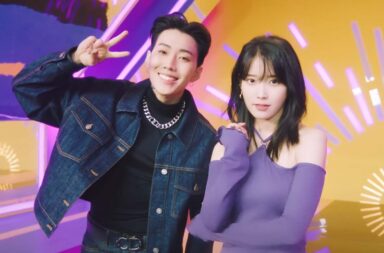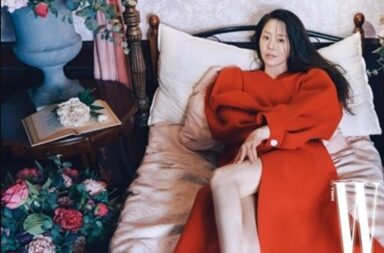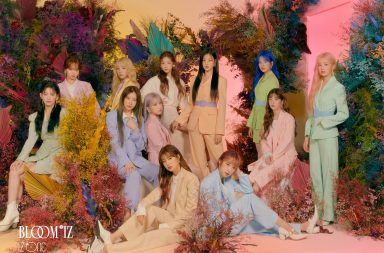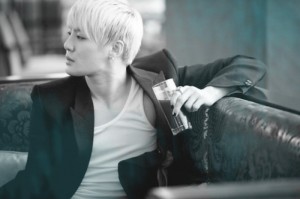 As you may realized by now, the first solo album of JYJ’s Junsu has been named after the spell from Harry Potter, Tarantallegra, a portmanteau of “tarantella” — an upbeat Italian folk dance associated with the tarantula — and “allegro,” the Italian word for fast. In Harry Potter and the Chamber of Secrets, the jinx could be used to induce victims into dancing uncontrollably, so with this knowledge in mind, it is expected for the album to be very dance-oriented, which I’m a bit wary of, because an album heavy on dance tracks will feel a little redundant and lacking substance, especially an album boasting twelve tracks.
As you may realized by now, the first solo album of JYJ’s Junsu has been named after the spell from Harry Potter, Tarantallegra, a portmanteau of “tarantella” — an upbeat Italian folk dance associated with the tarantula — and “allegro,” the Italian word for fast. In Harry Potter and the Chamber of Secrets, the jinx could be used to induce victims into dancing uncontrollably, so with this knowledge in mind, it is expected for the album to be very dance-oriented, which I’m a bit wary of, because an album heavy on dance tracks will feel a little redundant and lacking substance, especially an album boasting twelve tracks.
But seeing that Junsu is heavily involved in the producing, composing, and writing of the album, and having enjoyed the songs he composed and wrote for JYJ’s In Heaven album, “Fallen Leaves” and “You’re,” I still had some hope for Tarantallegra to be an enjoyable listen.
The album’s intro is titled “Sunset,” coinciding with the sinister elements of the music. It has absolutely no lyrics and the mingling of violins with steady synths was a good mix. From the teasers, Junsu was really calling on his more dramatic side and the intro felt really sinister, a good fit for his gothic concept. But its lack of lyrics made it feel like generic background music to a horror film, rather than an entrance into an album, and came off a little cheesy in that sense.
The album’s title track is “Tarantallegra.” Can I be the first to say that I was horrified by the usage of auto-tune on this track? The song starts off well enough with a low drum beat that builds up to an ominous orchestra. It felt like a storm brewing, which got me pumped up for the rest of the song, until I heard the chorus, and I shuddered. Even though the word Tarantallegra was an interesting choice to use an album and song title, using it as a part of a chorus, and completely blanketing with a thick layer of auto-tune, felt awkward and not catchy at all. The use of auto-tune should be reserved for aiding those who are vocally inept, not tampering with one of the best vocals in the business right now. It completely threw off the dramatic, dark feeling of the song and left me not enjoying the song as a whole. Despite feeling a little repetitive at times, Flowsik anchored the song with his solid rapping, which was a perfect complement to Junsu’s higher-pitched voice — left untampered, that is.
Another notable track on the album is “Fever.” With a title like “Fever,” it’s no doubt that it would be a dance track. Although it was overly produced in the beginning, once the song tones down and Junsu starts singing
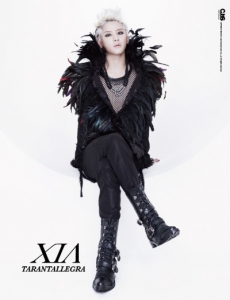 sans auto-tune, it’s an extremely catchy song. With its perfect match of Junsu’s vocals to the heavy synths and electronica, I rather have had used this song as the title track over “Tarantallegra” and used Flowsik in this song as well. Splices of Flowsik’s rapping would be a better fit for this song than “Tarantallegra,” without feeling repetitive.
sans auto-tune, it’s an extremely catchy song. With its perfect match of Junsu’s vocals to the heavy synths and electronica, I rather have had used this song as the title track over “Tarantallegra” and used Flowsik in this song as well. Splices of Flowsik’s rapping would be a better fit for this song than “Tarantallegra,” without feeling repetitive.
The outlier is “No Gain,” which was composed by my love fellow JYJ member Jaejoong, which has the supporting music of a dance track with elements of electronica accompanied by classical piano, but is primarily an R&B-esque ballad. Because it is a ballad, Junsu’s voice shines but thanks to the backtrack, it doesn’t seem too slow or lulling like a standard ballad. Although, it may be a sign that I may be hearing things, I can faintly detect traces of Jaejoong’s voice within the track, but my Jaejoong radar could be just acting up. Because of the emotive nature of Junsu’s voice, any ballad would be absolutely ear candy, so “No Gain” being the fourth track made me excited for the ballads to come.
The other ballads of the album, “Even Though You Already Know,” “I Turn Around and Around,” and “The Tree Covered in Dew” have the same old, classical feel of “Fallen Leaves” from In Heaven, which reiterates the influence Junsu’s musical career has had on his own music. The main problem with these songs is that after listening to them all, one after the other, they start to sound identical and are just showcases of Junsu’s vocal gymnastics rather than ballads used to create emotive responses, as ballads are intended to do. It seems like a waste to create three songs out of the same song, regardless if Junsu’s voice is great to listen to. It was deeply disappointing, because the ballads were what I was the most eager for, and it weakens how I feel about the album as a whole.
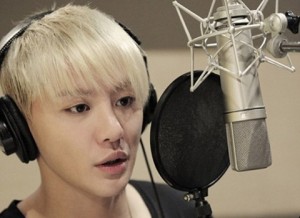 Junsu also decided to include two previously released songs, “Intoxication” and “I Don’t Like Love.” “Intoxication” was originally a Japanese song which wrote and performed during his Tohoshinki days, and is quite possibly the raunchiest song I’ve ever heard, second only to Salt N’ Pepa‘s “Push It.” The song is laden with sexual language, and is purely sensual to the point that its existence is completely unnecessary. Junsu can easily pull of sensual, I don’t need an entire song talking about what he wants do to a woman and vice versa. “I Don’t Like Love” was released before his solo album and is an OST for Rooftop Prince, which stars the “Y” of JYJ, Park Yoochun. It has the same stylings as the other three ballads in the album, with its chamber music and vocal gymnastics, so it was more frustrating than appealing. If I hadn’t listened to the song with the rest of the ballads on the album, I may have enjoyed it, but listening to four identical songs in a row influenced my opinion on the song.
Junsu also decided to include two previously released songs, “Intoxication” and “I Don’t Like Love.” “Intoxication” was originally a Japanese song which wrote and performed during his Tohoshinki days, and is quite possibly the raunchiest song I’ve ever heard, second only to Salt N’ Pepa‘s “Push It.” The song is laden with sexual language, and is purely sensual to the point that its existence is completely unnecessary. Junsu can easily pull of sensual, I don’t need an entire song talking about what he wants do to a woman and vice versa. “I Don’t Like Love” was released before his solo album and is an OST for Rooftop Prince, which stars the “Y” of JYJ, Park Yoochun. It has the same stylings as the other three ballads in the album, with its chamber music and vocal gymnastics, so it was more frustrating than appealing. If I hadn’t listened to the song with the rest of the ballads on the album, I may have enjoyed it, but listening to four identical songs in a row influenced my opinion on the song.
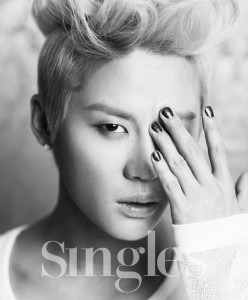 Other than “No Gain”, the standouts of the album were “Breath” featuring Double K, “Set Me Free” featuring Bizzy, and “Lullaby” featuring Dynamic Duo’s Gaeko. “Lullaby,” true to its name, is a lovely, slow song with a jazzy feel that reveals a different side to Junsu’s voice. Other than “No Gain,” it is the best ballad-type song on the album. “Set Me Free” is another dance track similar to “Fever” that
Other than “No Gain”, the standouts of the album were “Breath” featuring Double K, “Set Me Free” featuring Bizzy, and “Lullaby” featuring Dynamic Duo’s Gaeko. “Lullaby,” true to its name, is a lovely, slow song with a jazzy feel that reveals a different side to Junsu’s voice. Other than “No Gain,” it is the best ballad-type song on the album. “Set Me Free” is another dance track similar to “Fever” that When I heard that out of the JYJ members, Junsu would be the first to release a solo album, I wasn’t surprised. Junsu is the strongest within JYJ in terms of all-around talent, and was the obvious choice to create a solo album. He has the stage presence and vocal talent to carry his own solo performance and it is a shame that he won’t be able to perform any of his songs on any of the shows. But I can’t help but feel that it is a blessing in disguise. Despite his obvious talents, Junsu’s solo album endeavor is lackluster and doesn’t show his creative abilities as a songwriter and composer. With a few gems here and there, the album as a whole was a disappointment, especially the ballads.
This is something that will prove problematic with JYJ. It’s great that they are so heavily involved with their music, but they are performers first, and songwriters and composers last. They are too attached to musically playing it safe and sticking to what they know people will like from them, which is smart in theory, but ends making their music interchangeable and redundant. They need to start taking risks with their music, or else they’ll just end up becoming an one-note group.
Rating: 3.2/5
(CJES Entertainment, Singles, Kia27Nair, jaemin001)
